The One Thing Summary by Gary Keller teaches you why you should pay undivided attention to the most critical thing in your life when so many things are screaming for your attention. It also discusses how focusing on less can help you achieve more, thus making you more productive.
[amazon box=”1885167776″ template=”horizontal”]
Who should read “The One Thing Summary”?
- Anyone who wants to become more productive in life.
- One who is facing difficulty in maintaining self-discipline.
- Those who firmly believe in multitasking.
- All the enthusiasts who want to become successful.
- All who want to achieve more by doing less.
The One Thing Summary (PDF)
Success is hard.
It often requires a tremendous amount of effort to get there.
How you use your time determines how fast you will get to your destination.
It means that the things you decide to do in your life play a critical role.
And in this article, I’m going to share insights from The One Thing by Gary Keller.
Without further ado, let’s dive right in.
Go Narrow, Go Small
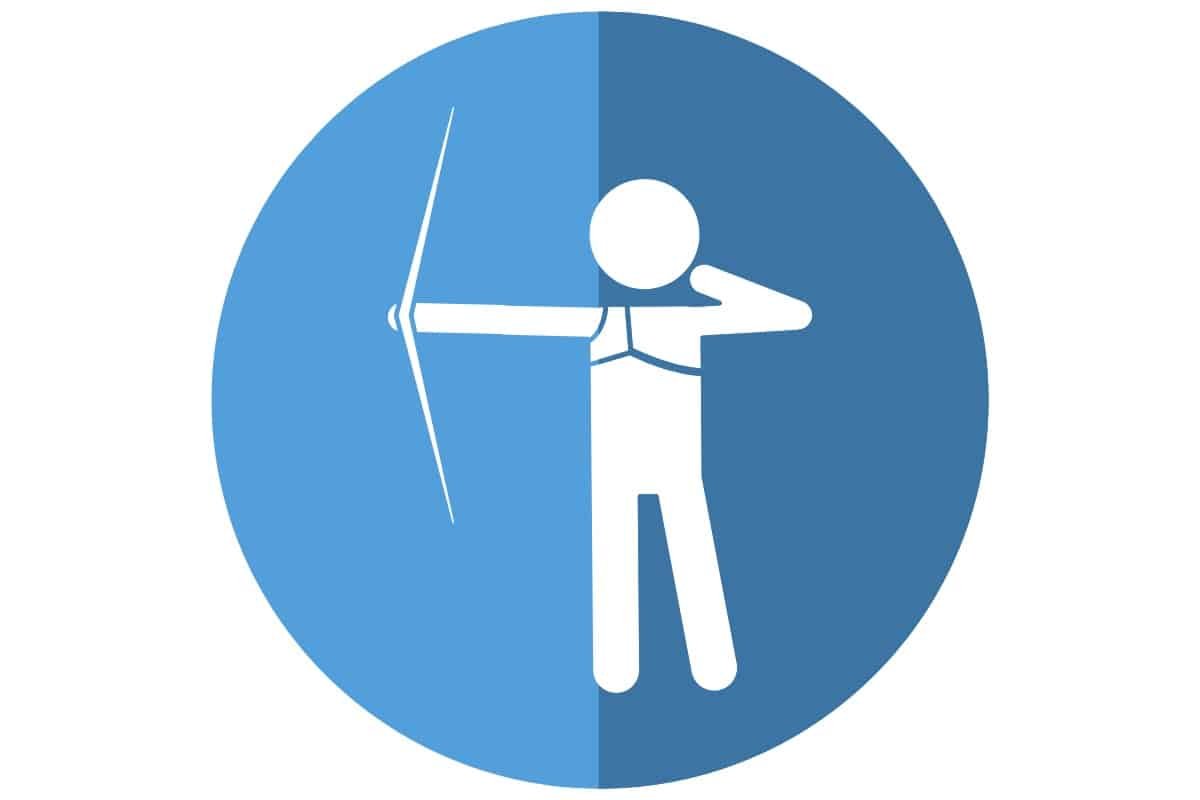
Everyone on this planet knows this simple fact if you want to complete a task correctly, you would have to pay attention to it.
But to achieve extraordinary results, you need laser-sharp focus. You need to give undivided attention to the task you are doing.
It’s like a converging lens that can focus the sun’s rays and burn the paper.
Your attention should be so concentrated that it goes through the task at hand in the same fashion.
Now the question comes to mind, “How do you achieve laser-sharp focus?”
One way to do it is to do a few things well instead of doing many things terribly.
People these days have the misconception that the more busy you get by doing many tasks together, the more you accomplish.
It happens to be true most of the time, but it affects the quality of results.
Let me give you an example:
Let’s say a juggler is juggling three balls at the same time.
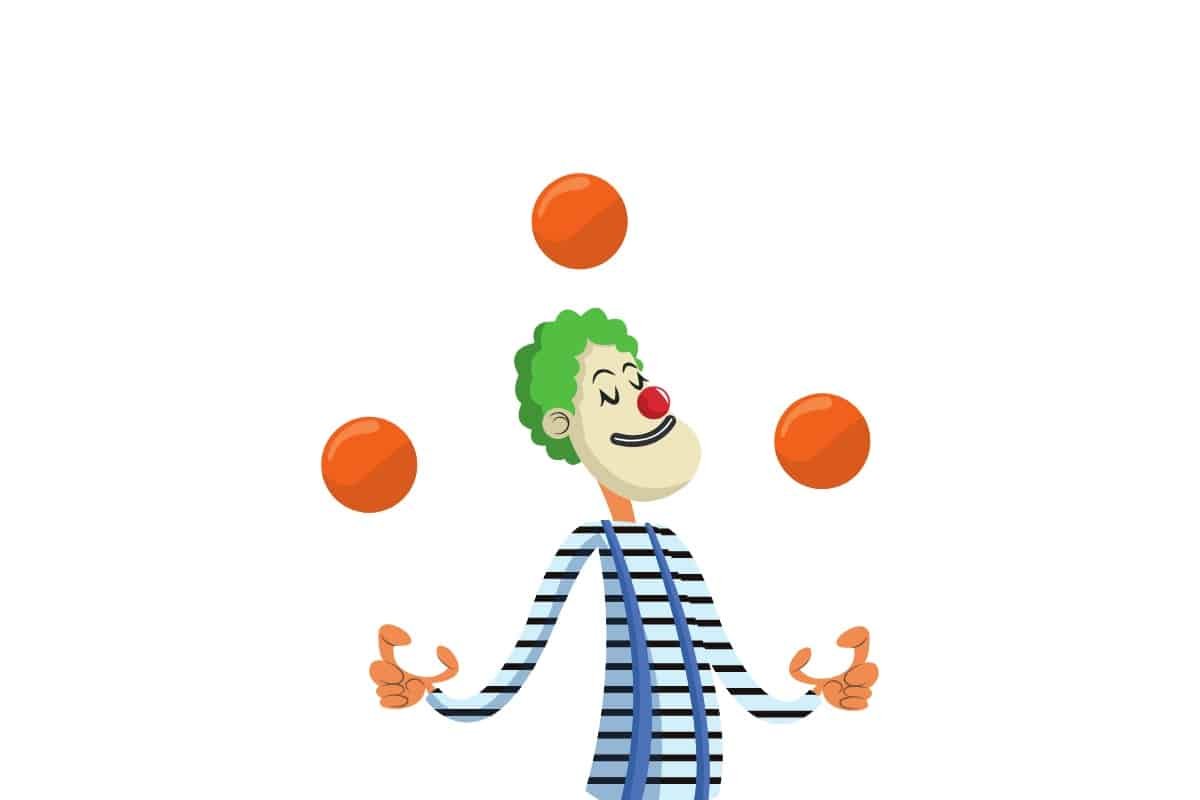
Looks easy, doesn’t it?
Now let’s increase the complexity a bit.
Let’s say the juggler starts juggling six balls at the same time.
What do you think would happen?
It would get more challenging for the juggler to juggle all the balls.
It’d require more effort and willpower than earlier.
Although it looks like the juggler is paying attention to all the balls simultaneously, he doesn’t.
He subconsciously switches his attention from ball to ball.
“Juggling is an illusion,” says Gary.
The same happens to us when we take on so many tasks simultaneously.
When we try to do so many things simultaneously, we switch our attention from task to task.
As the number of tasks increases, our attention span on each task decreases.
In the pursuit of going wide, we end up thin.
Just look at the number of tabs open in your browser right now.
How many are they?
Maybe two. Maybe twenty. Maybe 40. Maybe X (who knows how many?).
How many of them are you using right now?
“It’s no big deal. I can manage.” That’s what your inner voice is probably saying right now. Isn’t it?
The thing is, extraordinary results come from exceptional focus.
Unless you dedicate yourself to a particular task, you won’t be able to do it with your hundred percent potential.
No matter how easy a job looks, if you do just that, ignoring all the other tasks, you’ll complete that task faster.
The choice is yours, either you go big or go small.
The smaller you go, the better you do.
And the narrower your focus is, the higher your efficiency gets.
Don’t do everything, do only one thing.
This method guarantees that you reach your goals faster.
The Domino Effect
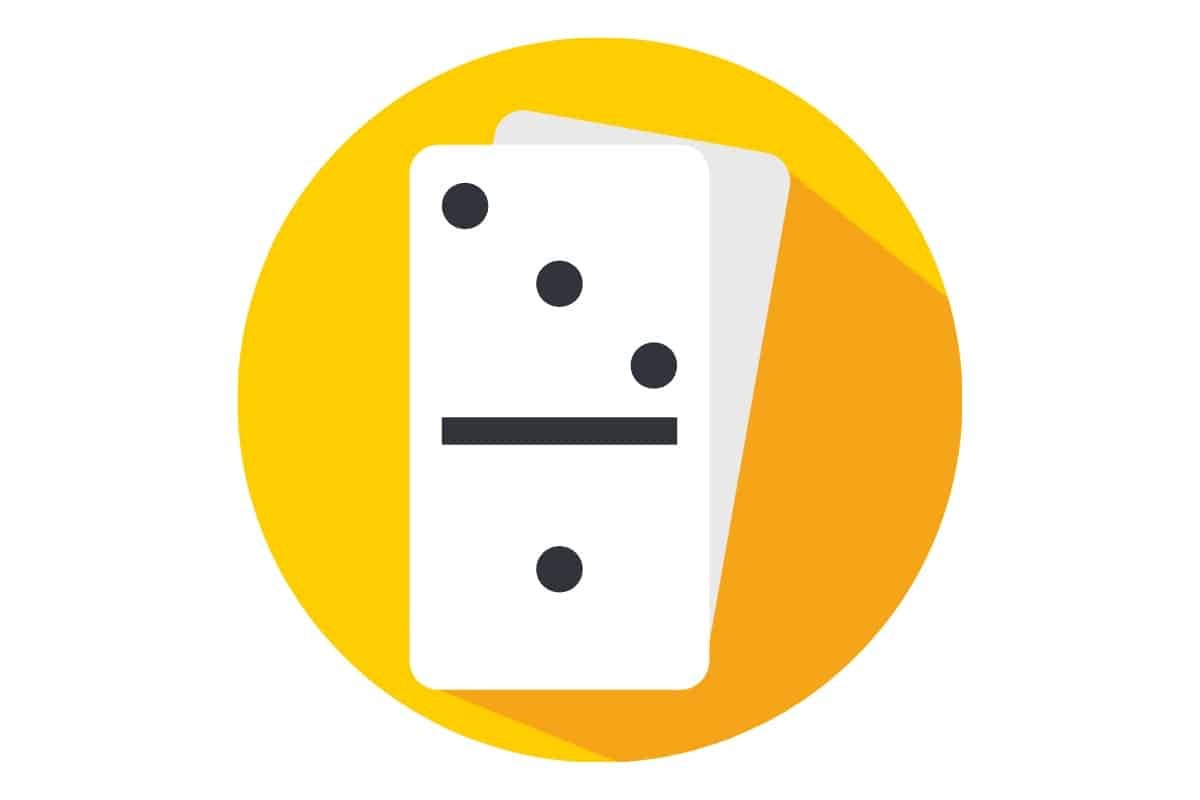
I’m not going to explain what the Domino Effect is.
Instead, I will tell you how it’s applicable in real life.
Okay, let me tell you.
You have goals, right?
Some might be so big that they even give you goosebumps when you think about them.
While some might be too little that you don’t even care about them.
Isn’t it?
Think of your goals as little dominoes lined up.
Now focus all your energy on whacking away the first domino, then second, then third, then…
When you hit all your goals with complete focus one by one, a chain reaction starts.
Initially, you hit one domino, then that domino falls, then its energy (result) makes other dominoes fall.
And this keeps going on…
This is how the Domino effect works in real life.
Likewise, success isn’t a one-time thing.
First, you achieve little goals. Then those accomplished goals help you achieve bigger goals.
Eventually, the energy produced by your dominoes becomes so big that you become capable of achieving extraordinary results.
The only thing worth remembering is that the domino effect won’t occur unless you focus on one thing at a time.
Remember that:
Success is sequential, not simultaneous.
Garry Keller
Take small steps. Think big. Go small.
Don’t be busy
Many people believe that if you are not doing something, you are missing out on opportunities.
Consequently, such people are always in a rush. They try whatever they can do.
They consume every moment of their life doing something.
They don’t take breaks. To them, taking a break is a waste of time.
Is this the right approach?
I don’t know.
But certainly, it isn’t the most productive approach.
Just as cluttering your mind with thoughts doesn’t necessarily make you a better thinker, doing many things with lost focus doesn’t make you any productive.
You might have to-do lists, spreadsheets, or deadlines to catch up to.
All those things won’t move the needle unless you have a clear sense of priority.
You must be crystal clear about what is the most important thing right now that can drive your day.
Being busy might give you a sense of achievement, but it doesn’t provide an easy path to results.
In fact, by being busy, you lose focus and undermine the level of success you can achieve.
Look at your To-do-list.
Is it loaded? Is it cluttered?
If your answer is “yes,” then do this:
Turn your To-do-list into a success list.
Here is how you can do it:
Ruthlessly remove all things that don’t have the potential to drive your day.
Focus on the most important thing right now.
To-do lists are more extended, unorganized, and lack focus, while the success list is shorter, concentrated, and highly organized.
The more you have on the table, the more confused you become.
A confused and distracted mind lacks focus, which is essential in achieving extraordinary results.
On top of that, when you do too much, you get stressed and lose your ability to think clearly.
Don’t be busy, be productive instead.
Extreme Pareto
According to the Pareto principle, 20 percent of tasks contribute to 80 percent of results.
Gary asks you to go extreme and beyond the Pareto principle.
This is how you do it:
When you figure out what your 20 percent is, don’t settle.
Don’t stop just yet.
Narrow it down and find the one thing that has the potential to change your life.
Find the one thing that would drive your day.
Find what matters the most from all the things that matter.
And dedicate yourself to that thing.
Don’t be a disciplined person
It’s one of the most prevalent myths of our culture: self-discipline.
Leo Babauta
Yeah, I’ll admit. I was also shocked when I read this line in the book.
By this, Gary discussed that discipline isn’t required all the time.
We only require discipline until we develop the habits needed to achieve success.
“The trick to success is to choose the right habit and bring just enough discipline to establish it.”
What do you think about great achievers? Did they all have discipline?
I think they all had discipline, but not as much as we believe they did.
They maintained just enough discipline to establish powerful habits.
The role of discipline in achievement reduces with time.
Again, you don’t need to develop too many habits at one time.
Build one habit at a time.
Even the achievers didn’t have the discipline to acquire many habits in one go.
Remember, success is sequential.
You might have heard the phrase, “You are your habits.” It’s true.
The habits you develop become your routine, and ultimately, they forge your life.
With habit creation, you can do wonders.
Fill Your Willpower Tank
Most people don’t focus on their willpower.
They think they can summon their willpower however they want and whenever they want.
The staggering thing is that the latter part of the above sentence isn’t true at all.
Willpower is limited. One can’t use it all the time.
It is like a tank with a small hole at the bottom. It leaks out as the day passes.
It’s limited. It’s a renewable resource that gets renewed every day you wake up and tanks by the time you go to sleep.
The more intensive the task you do, the faster it depletes.
Why do you need to manage your willpower?
It’s because bigger goals often require efforts that need loads of raw willpower.
We talked earlier about habit creation and discipline. They require a certain amount of raw willpower to be established.
Your willpower is a valuable resource that you must use wisely.
“Okay, tell me the solution.”
Do the most intensive tasks when your willpower is brimming.
For most people, it’s the morning time.
When you wake up in the morning, your willpower is maximum.
Like this:
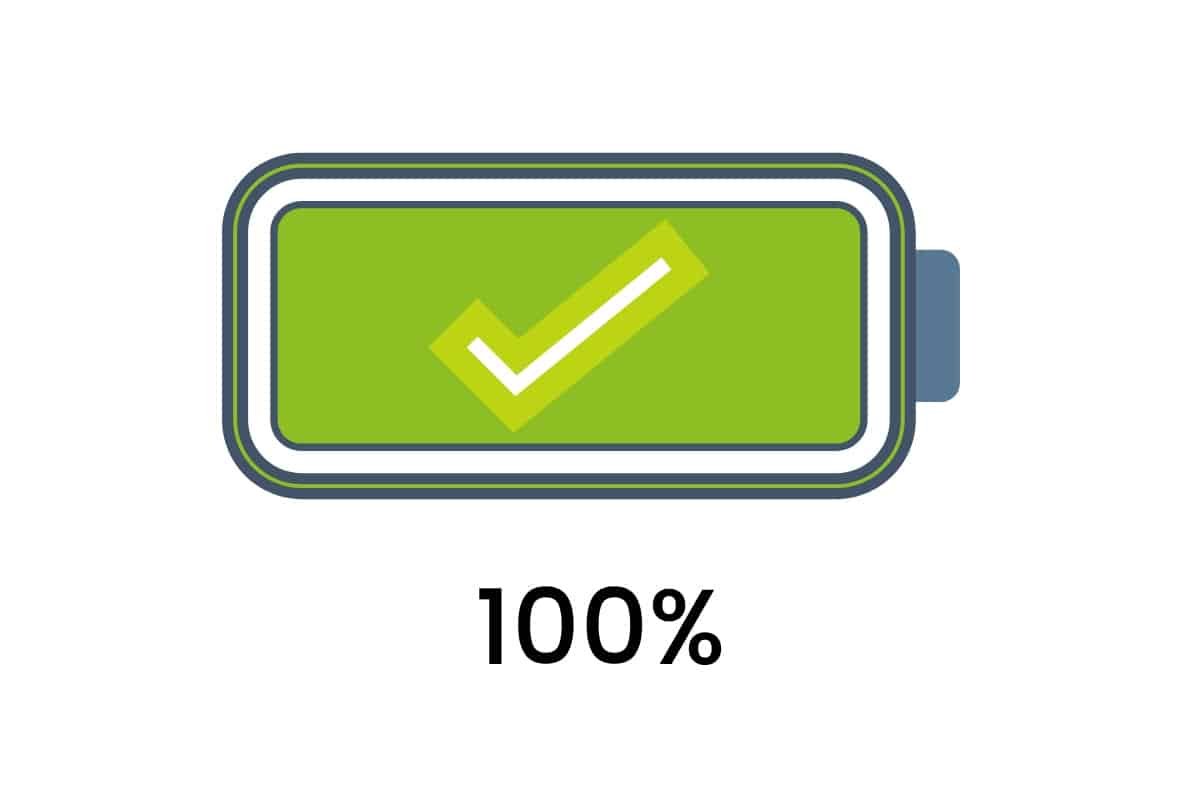
But as the day gets over, it becomes so low.
Then it looks something like this:
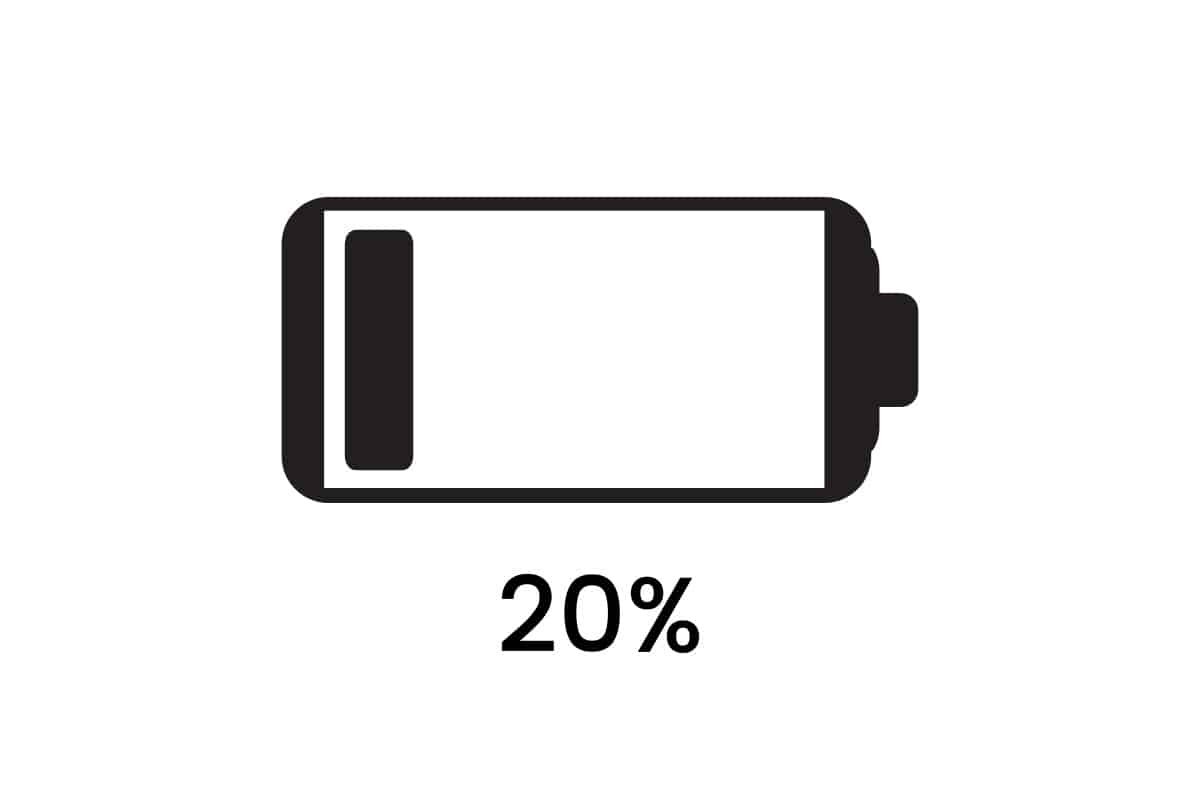
And this is the reason that many self-help gurus suggest that you do your most creative and mind-boggling work in the morning.
Willpower is like a powerhouse within you.
Use it wisely, and you will achieve high productivity.
It would be best if you don’t force your willpower.
The best approach is to build your day around it.
Work with your willpower. Please don’t abuse it.
A Balanced life is a pipe dream
The truth is, balanced life is an unattainable pipe dream …The quest for balance between work and life, as we’ve come to think of it, isn’t just a losing proposition; it’s hurtful, destructive one.
Keith H. Hammonds
Stop pursuing more balance in life.
Live a life with purpose.
“I need more balance.”
People keep chanting this mantra as if it’s a solution to all their problems.
Sadly, if you want to achieve the extraordinary, you need to do something extraordinary.
Balance isn’t extraordinary.
Balance can help you achieve simple things, but it won’t help you succeed.
To achieve anything extraordinary, you need excellent time commitment.
You want to become the best footballer globally, then dedicate most of your time to football.
You want to become the best chef that has ever walked on this planet, then dedicate most of your time to cooking.
The reason we shouldn’t pursue balance is that the magic never happens in the middle; magic happens at the extremes.
Garry Keller, The One Thing
We all want a hassle-free life.
But it gets super hard to achieve balance in life when you live your life at the extremes.
For example, you may end up with relationship issues. Or you might end up with bad grades.
And who knows what you might end up with.
People will call you a workaholic. People will advise you not to burn yourself out.
The thing is, you can’t manage everything.
Manage only one thing properly, then counterbalance others.
Even though living in the middle gives you a sense of calm and peace, it doesn’t lead you to extraordinary results.
You can’t do everything right.
Do only one thing right.
Stop balancing. Start prioritizing.
We often choose what is available to us.
Gary says, don’t choose from what is available.
Think out of the box.
In particular, think big.
Don’t think small.
Thinking small is easy.
Goals that don’t compel you to think big don’t guide you to success.
The bigger you think, the bigger the outcome is produced.
People who are crazy enough to think they can change the world are the only ones who do.
Apple Ad
The Focusing Question
Great achievers possess a curious mind. They ask Great questions.
Gary wants you to ask yourself:
“What’s the one thing I can do such that by doing it, everything else will be easier or unnecessary?”
If you carefully observe this question, then you would find that it is made up of three parts:
Part One: “What’s the one thing I can do…”
Part Two: “…such that by doing it…”
Part Three: “…everything else will be easier or unnecessary?”
Part One focuses on finding one thing.
Part Two sets the criterion for that thing.
Part Three enforces the idea that whatever your one thing is, it should be big enough that other things become less significant or easier.
It helps you find the answer to what matters the most in the short-term and long term.
By asking yourself this question, you would see both the big and the small picture of your life.
This question would help you to focus on ONE thing at a time.
The One Thing Summary Infographic
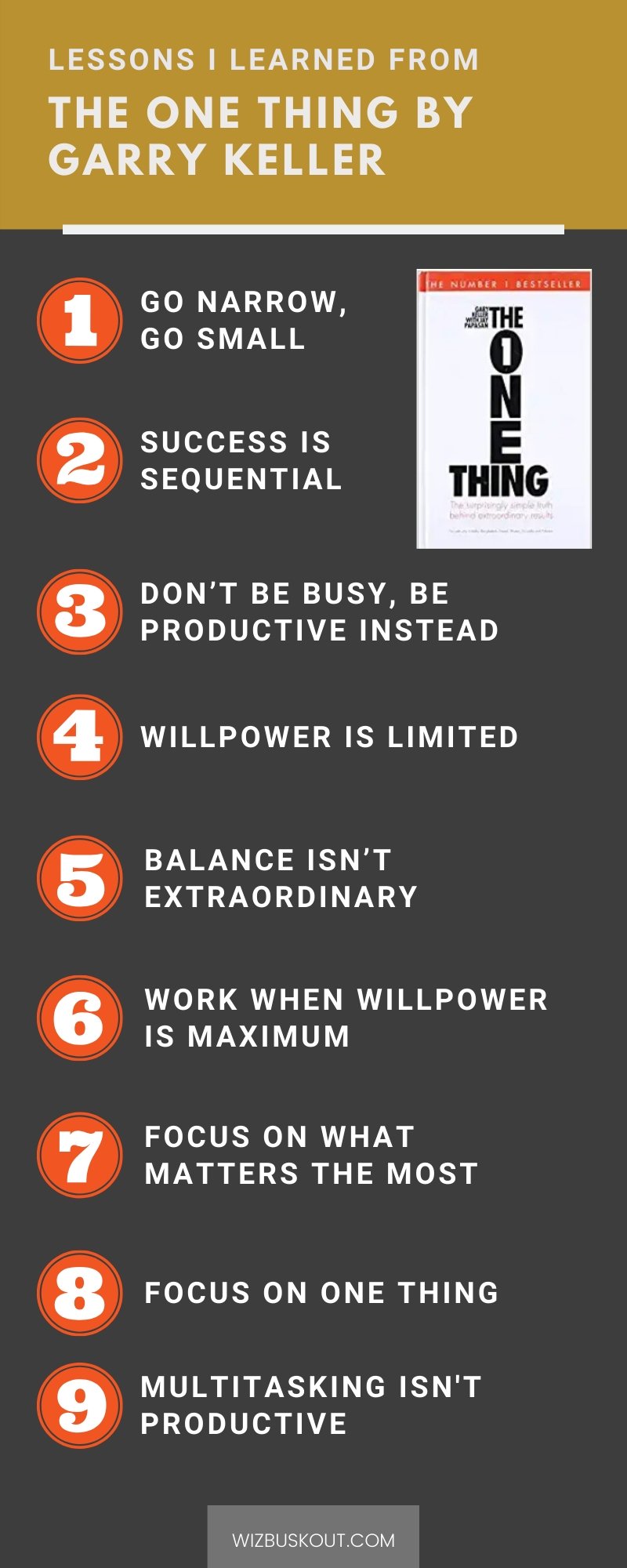
The One Thing Review
[amazon box=”1885167776″ template=”horizontal”]
Well, this book focuses on clearing the clutter and finding your ONE thing.
It is almost like a productivity guide that you can use to set priorities in your life.
What I liked about it is the idea that you can’t get something extraordinary unless you are willing to dedicate yourself.
Also, it busts the myth of Multitasking.
This book’s biggest mantra is the focusing question that works like magic.
The thing I didn’t like about this book is that the author has repeated some things over and over.
For example, the concept of “clearing the clutter.” It is a bit overused throughout the book.
Overall, the book is packed with practical stuff.
Now it’s your turn
What’s your One Thing?
Do you believe self-discipline is a lie?
Tell me in the comments. I’m all ears.
If you enjoyed reading The One Thing Summary, please share this with your friends and family members to help them find their ONE thing in life.
